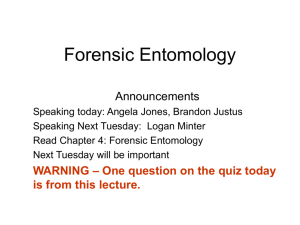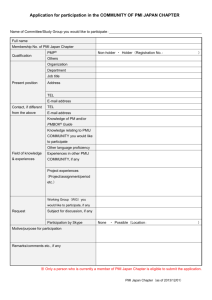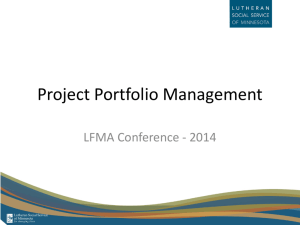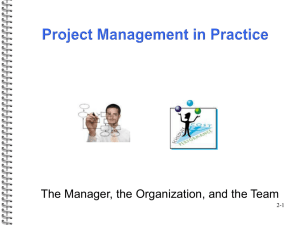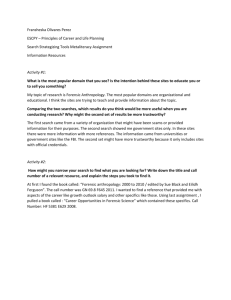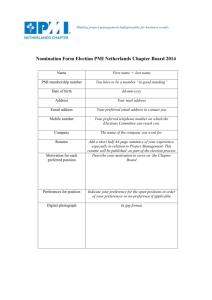Forensic Anthropology: A New Method to Estimate the Time Since
advertisement
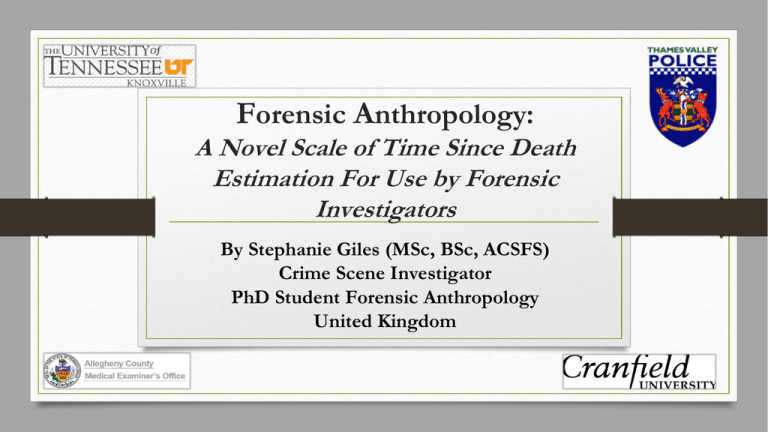
Forensic Anthropology: A Novel Scale of Time Since Death Estimation For Use by Forensic Investigators By Stephanie Giles (MSc, BSc, ACSFS) Crime Scene Investigator PhD Student Forensic Anthropology United Kingdom Aims 1) Develop a new time-since-death estimation method 2) Make a system suitable for use by forensic investigators 3) Validate against current time-since-death estimation methods Background PMI = Time Deceased Found - Time of Death x No Methodology x Qualitative x High PMI Error x Use for CSI's? The Problem... x Small sample sizes x Non-human analogues x Experimental conditions x Low-level theories x Limited applicability to forensic practice PMI Estimation Methods Category Methods Laboratory / Mortuary Biochemical Markers, Aqueous Vitreous, Stomach contents, Algor Mortis, Rigor Mortis, Livor Mortis Death Investigation Circumstantial evidence, visual observations, temperature Forensic Entomology Experimental Universal PMI Formulae (Vass, 2011) Point-scoring Decomposition (Megyesi, 2005) Methodology Retrospective Study 128 cases of decomposition (Photographs + Case Reports) 31 decomposition traits assessed G-H Scale: Statistical-based PMI method The Body Farm - 10 donations Comparative Study Example: G-H Scale Simple and easy to use Applicable to forensic setting Based on statistical analysis Accounts for insect activity Weighting of PMI classes Potential for autopsy use Results Frequency Graph: The Relationship between PMI and Stage of Decay PhD Aims (1)Improving Police Investigations of time-since death estimations (2)Develop forensic taphonomy into a more rigorous scientific discipline (3)Establish a National Post-Mortem Interval Database Research Questions + Methodology (1) Can we use retrospective datasets to inform our understanding of estimating the PMI? • Devise a UK G-H scale (Thames Valley Police Data) • Bayesian approach to Decomposition Data • Photography Experiments “Tapho-epidemiology” The Epidemiology of Decomposition (2) Can an epidemiological approach be applied to decomposition datasets? • • • Decomposition in the dead vs disease in the living Understand decomposition in terms of:- Frequency - Pattern Establish a National PMI Database: - Demographic decomposition data - Assist unknown PMI cases Forensic Application (3) Can we develop a tool to assist in PMI estimations that is applicable to police investigations of decomposed deaths? • Develop a standard operating procedure (SOP) for recording decomposition at death scenes. • Statistically rigorous tool to improve CSI judgement of PMI estimations • Quick, uncostly & simple to implement operationally and nationally Any Questions? Stephanie Giles (MSc, BSc, ACSFS) S.B.Giles@Cranfield.ac.uk Acknowledgments Dr Karl Harrison, Forensic Archaeologist, Alecto Forensics UK Dr Nicholas Marquez-Grant, Forensic Anthropologtist, Cranfield University, UK Dr Dawnie Steadman, Director FAC, Professor of Anthropology, University of Tennessee, USA Dr Karl Williams, Medical Examiner, Allegheny County Medical Examiner’s Office, USA
